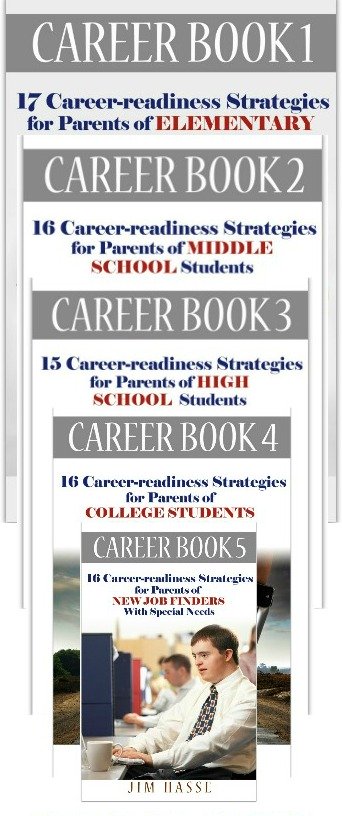Salary Calculator: Cerebral Palsy Career Builder for Job Seekers
By Jim Hasse, ABC, GCDF, Disability Employment Expert
_________________________________________________________
Be your own best salary calculator.
That’s my advice for the new job seeker with cerebral palsy (CP) you may be currently guiding as a parent, mentor or coach.
In fact, there are four steps your mentee can take now to get the salary and benefits he or she deserves as a job seeker.
But, first let’s set the stage for that between-school-and-work period when your son or daughter begins to look online for a salary calculator which will give ballpark figures about what compensation a particular job should bring.
How to approach salary, benefit negotiations
Salary and benefits are not always cast in stone, especially if the job is beyond the entry level.
Your job seeker needs to remember that he or she is always a “seller” -- not a “buyer.” Even after being offered a job, it’s important that he or she retains that “selling” mindset.
Prospective employers are “buyers.” After all, a hiring manager does not “give” an applicant a job. A successful job candidate “earns” it because, based on skills, attributes and experience, he or she is the best candidate for the job in the eyes of the hiring manager.
In other words, your job seeker has “value” -- which may come as a surprise to you both because CP can lead to feelings of being “discounted” in other situations (recreation opportunities, romantic relationships etc.) because of it.
In many cases, negotiating salary and benefits is like being a street vendor in Nairobi. Your job seeker has a fine piece of linen to sell. A shopper stops and is looking for a bargain. That shopper has a maximum amount he or she will pay. Your job seeker has a minimum price at which he or she will sell.
Like any other merchant, your son or daughter needs to know what “price” to set, in his or her own mind, for the product -- in this case, his or her selling skills, attributes, temperament and experience as an employee. That’s when a salary calculator comes in handy. And, then, the next step is to negotiate for it, if the “price” offered is out of line with the market and the kind of product being sold.
But, what is a person worth as an employee? Like the price of any other product, what salary and benefits a job seeker gets is determined by a number of factors – not just the results of an online salary calculator.
When a strict salary and benefit structure is not in place, here are four questions your job seeker can ask him or herself before deciding how far to press an employer about salary and benefit issues after a job offer has been received.
- What is the job worth in
the marketplace?
- What does the employer
really need?
- How well do I meet those
employer needs?
- Do I know how to negotiate effectively?
Now is the time to pass this four-cornered salary calculator on to your new job seeker. Here is more detail:

What is the job worth in the marketplace?
You can get a good idea about the appropriate salary range for the job you’ve just been offered by using a combination of these tools:
- Salary.com's free Salary Wizard, which is an actual
online salary calculator.
- The current Occupational Outlook Handbook by the
U.S. Department of Labor.
- The salary and compensation web
sites listed on Monster.com,
another helpful salary calculator resource.
- Career placement services.
- Online networking and in-person
informational interviews.
- Professional associations.
Study the Occupational Outlook Handbook closely for trends in jobs which are increasing in demand and those which are decreasing in demand. Where does the job you’ve just been offered fall?
That will give you some idea of what kind of “wiggle room” you
have when you’re negotiating your salary and benefits. Jobs with short supply
offer more opportunity for negotiation than jobs which have static or falling
demand.
What does the employer really need?
Even if the job you’ve just been offered is not in high demand, you
can be. At this point, hopefully, you’ve done your research and know as much
about the company as you can. You know what your hiring manager realizes he
needs as well as, perhaps, his unrealized needs.
And, you’ve done a good bit of work in showing how
what you offer matches his needs -- especially the needs that that he believes
are most critical.
How well do I meet those employer needs?
Does your new hiring manager really need someone with online marketing expertise or heavyweight contacts within the publishing industry or first-hand experience in the landscaping business for high-end homeowners?
If your expertise goes beyond the minimum qualifications for the job you’re offered and you’ve been able to show how your expertise can fill a previously unrecognized hole, you’re in a good position to negotiate a compensation deal that goes beyond what was in the initial job announcement.
If, however, in the eyes of your new hiring manager, you appear to be qualified, trainable but not yet seasoned in the disciplines which really count within the company, you’re probably not in a good position to negotiate salary and benefits beyond what was first slated for the job.
Do I know how to negotiate effectively?
But, if you’re satisfied with your responses to those first three questions I’ve posed, then you’re ready to negotiate with your new employer about your salary and benefits.
First, let’s consider what is relevant (and what is not) in such negotiations. In general, your needs -- or even your wants -- are not the basis for your worth as a worker in the eyes of an employer. But, location can be. After all, there can be quite a difference in living expenses between a job in Manhattan, Kansas, and one in Manhattan, New York City. Rely on online salary calculator resources for getting a picture of differences in living expenses by location.
Second, what you were paid in the past is not what you are worth now for a particular job.
“It shouldn't matter what you were making at your last job, especially in a world where 17-year-olds who were earning five bucks an hour flipping burgers last year are earning $40k this year designing web pages and where $100k executives are seeking $50k sales jobs,” writes Nick Corcodilos, host of asktheheadhunter.com.
If an employer tries to get you to say what you've been making, use it as an opportunity to showcase your diplomatic skills. Steer the conversation back to the value of the job to the company (and specifically to your hiring manager).
Third, your disability is not relevant. By the time you’re discussing salary and benefits of a job, you should have eliminated the impact of your CP on such negotiations.
Don't wait for the employer to bring up the topic of salary and benefits, but don't put your expectations in your résumé or cover letter or in a conversation that is not part of the negotiation process. Instead, put on your “negotiator” hat before the negotiation process begins and think about what you want, what your hiring manager wants, and how you can persuade him or her to come around to your way of thinking.
What are the important issues to negotiate? Salary? Other benefits? Opportunities for advancement? You need to know what you want, but your hiring manager also needs to know what he or she has to offer.
In short, are you looking at the negotiation from the employer’s point of view as much or more than your own? That’s vital, if you want to succeed with negotiations.
Most of all, be persuasive, be realistic, be open, be
flexible, be articulate and be prepared. And be ready to learn from the result
so you can be better prepared in future negotiations. In doing so, you’ve
become your own best salary calculator.
Return from Salary Calculator to Job
Finder
Go to Cerebral Palsy Career Builders
This is Creative Commons content. You can freely and legally use, share and repurpose it for non-commercial purposes only, provided you attach this sentence and the following attribution to it (including the two links):
Originally written and illustrated by Jim Hasse, ABC, GCDF, owner of Hasse Communication Counseling, LLC, who, as a person with cerebral palsy, served for 10 years as a vice president in a Fortune 500 company during his 29-year career in corporate communication. He’s an Accredited Business Communicator, certified as a Global Career Development Facilitator and author of 14 Amazon books about disability awareness and disability employment issues.





